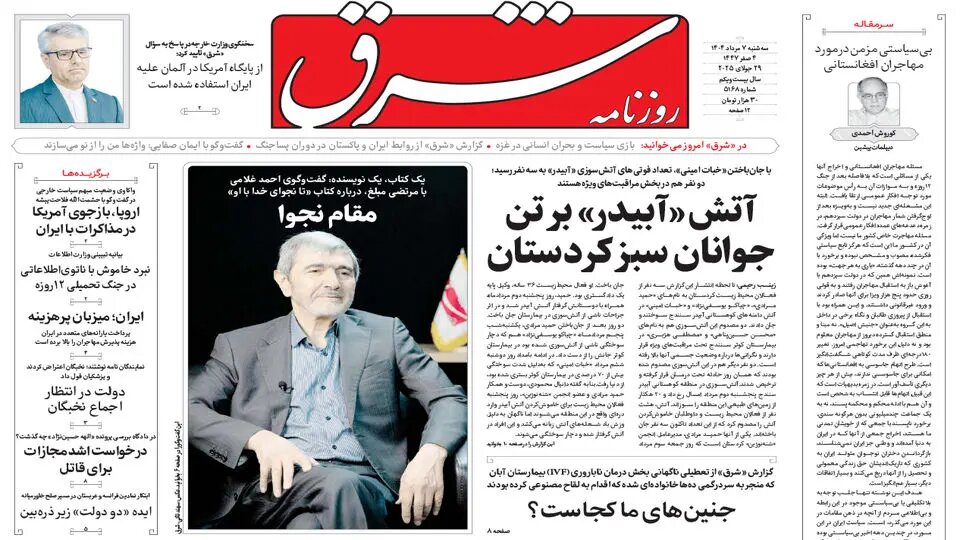Serious doubts about E3 sincerity

TEHRAN - In an analysis, the Shargh newspaper analyzed the new round of negotiations between Iran and the European troika (Britain, France, and Germany) in Istanbul on Friday, July 25, and wrote: This round of negotiations was an opportunity to revive diplomacy and remove obstacles to a (possible new) nuclear agreement.
However, the threatening statement of the European troika and the statements of the French Foreign Minister Barrot, just two days after these negotiations, indicate a lack of goodwill. This timing conveys a pre-planned message that Europe, instead of focusing on the progress of the negotiations, seeks to increase pressure on Iran. The threat of the European troika to activate the snapback mechanism is a pressure tool that will restore UN sanctions if an agreement is not reached by the end of the summer. This threat is made at a time that indirect negotiations between Iran and the United States has been suspended due to attacks by the Zionist regime on Iran with the U.S. support. Iran has emphasized that the continuation of the negotiations requires guarantees for security and the non-repetition of hostile actions. However, instead of removing these obstacles, Europe is making the atmosphere more tense by making unrealistic demands and threatening sanctions. This approach not only undermines Iran's confidence in the negotiations but could also push Tehran towards countermeasures, such as limiting its nuclear commitments further.
Siasat-e-Rooz: A powerful response to the enemy
In a note, Siasat-e-Rooz outlined a strategy for how Iran should respond to any act of aggression from adversaries. It stated that Iran’s stance toward Western countries—those seeking to impose political and economic pressure—should be conveyed in strong, sharp, and revolutionary language. The note emphasized the importance of relying on the unmatched capabilities of the Iranian armed forces, which were demonstrated during Israel’s 12-day intensive war with the Islamic Republic. Iran’s military response ultimately compelled the enemy to accept a ceasefire, highlighting the nation's defensive strength. The armed forces, it said, will defend Iran and its people to the last breath. Therefore, Iranian officials should place greater trust in the military and, during discussions with Western representatives, make clear that Iran’s forces are prepared to act. At the slightest sign of threat or aggression, a torrent of missiles and drones would rain down on any enemy that initiates hostilities.
Javan: Weighing military costs, the enemy is resorting to unrest project
Javan analyzed Iran’s missile strikes targeting Tel Aviv and other locations within the occupied territories, highlighting the Zionist regime’s failure to achieve its objectives—resulting in a temporary halt to the conflict. The regime’s surprise attack on Iran had several key goals: dismantling the resistance front, destroying Iran’s missile and nuclear capabilities, crippling national infrastructure, and ultimately weakening the Islamic Republic. However, Iran’s swift military recovery and, more importantly, the powerful surge of national unity and cohesion in response to the aggression derailed these plans. In place of direct military confrontation, the enemy has turned to a new strategy: a project of unrest and internal destabilization aimed at advancing its ambitions. This shift reflects the broader move by Zionist-American forces from overt warfare to covert influence operations. The United States is keenly aware that an all-out war with Iran would carry immense political and military costs, particularly at a time of rising global competition with China and Russia. Instead, America is working to reshape the regional order to serve its interests, leveraging current tensions and seeking to weaken the resistance movement through strategic recalibration.
Donya-e-Eqtesad: A double-edged sword
In an interview with political analyst Rahman Ghahremanpour, Donya-e-Eqtesad explored the nuances of Iran’s cooperation with the International Atomic Energy Agency (IAEA). Ghahremanpour described the relationship as a "double-edged sword." He explained that if Iran's collaboration is deliberate and well-calibrated, it could amplify the country's voice on the global stage. This, in turn, might encourage certain non-Western states within the IAEA Board of Governors to align with Iran's position. Conversely, a lack of cooperation could lead to renewed negative reports from the Agency—reports that could be used as justification for increased international pressure. Ghahremanpour emphasized the importance of managing specific inspection cases that have previously been vulnerable to misinterpretation or misuse by Agency inspectors. These areas must be addressed systematically to prevent future abuse. He concluded by affirming that cooperation with the Agency is essential. However, he suggested that a revised framework be developed—one that redefines the way Iran interacts with inspectors, presents its reports, and resolves outstanding points of contention. Such a framework, he said, would ensure Iran’s legitimate concerns are taken into account.
Leave a Comment